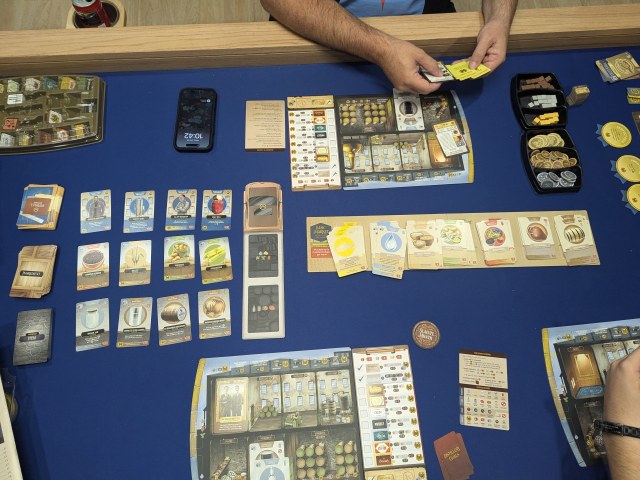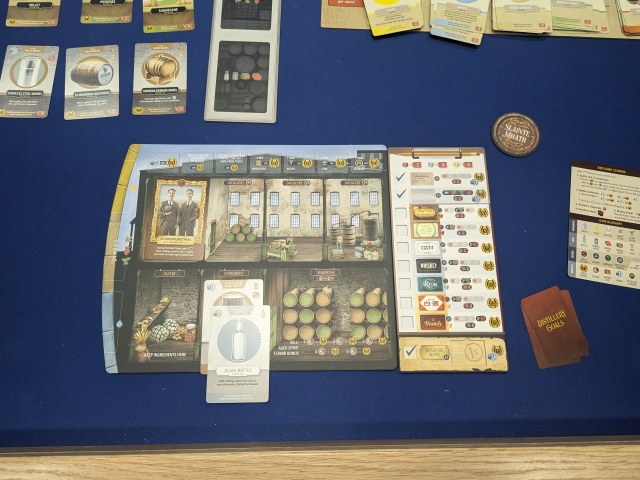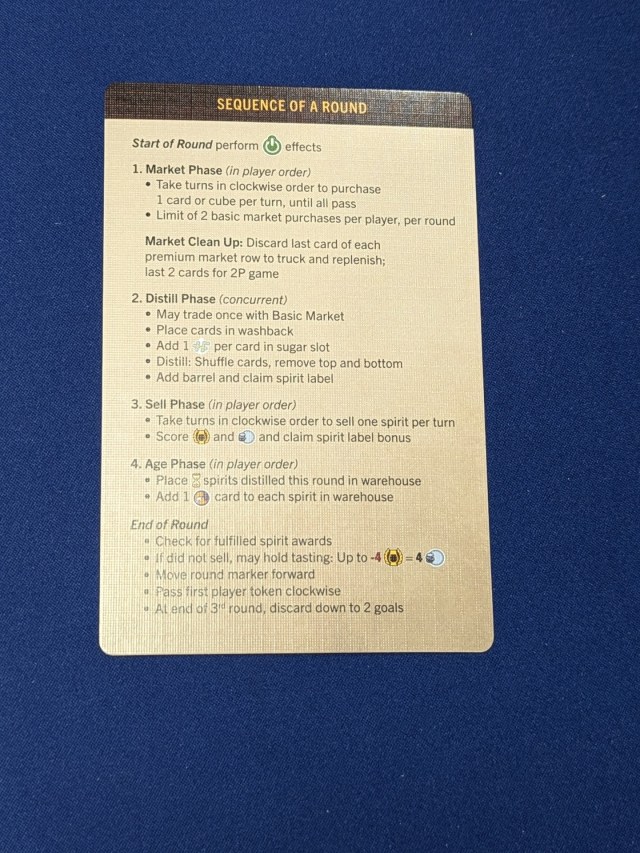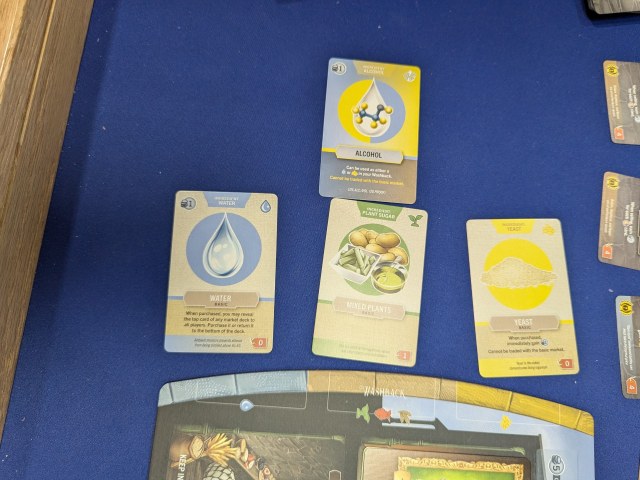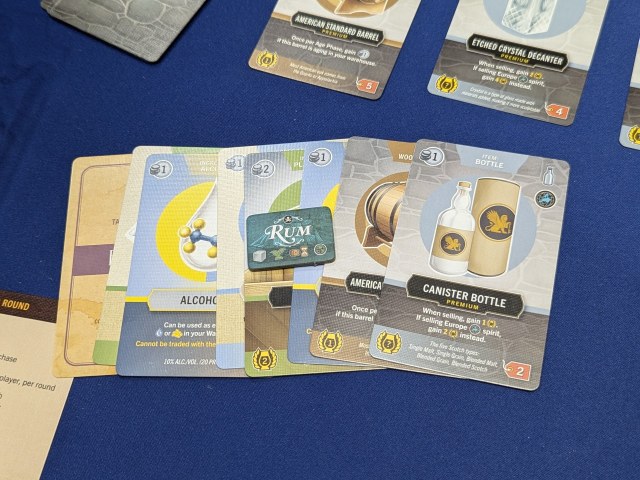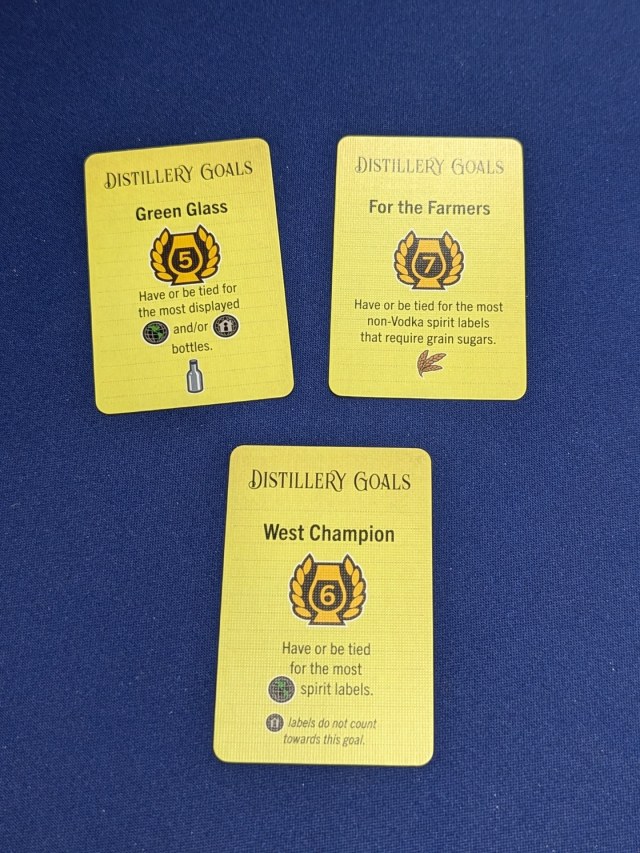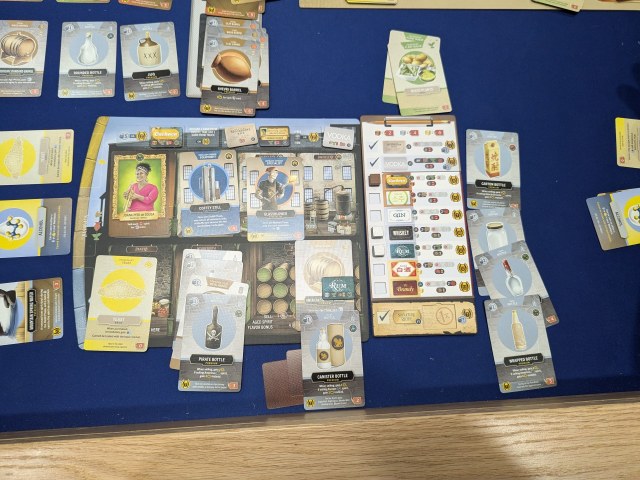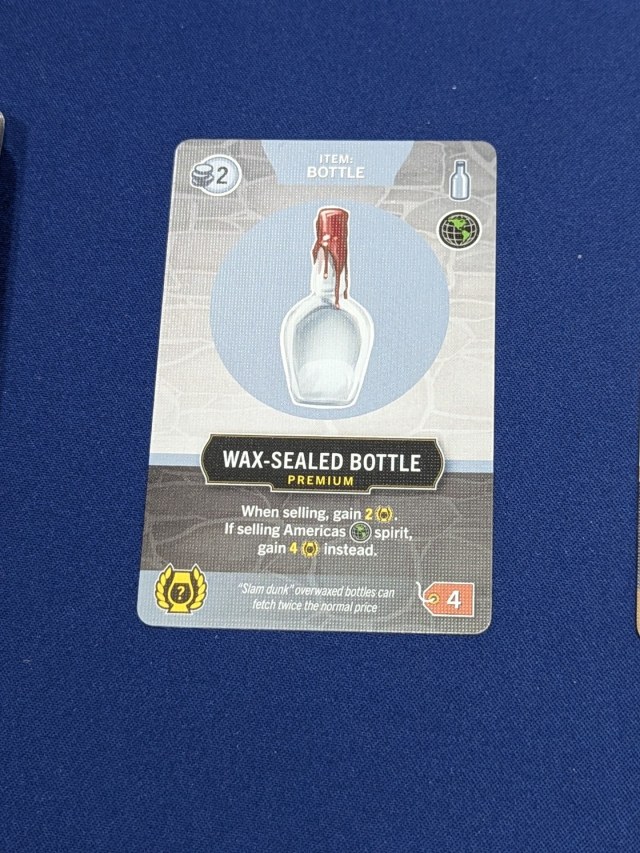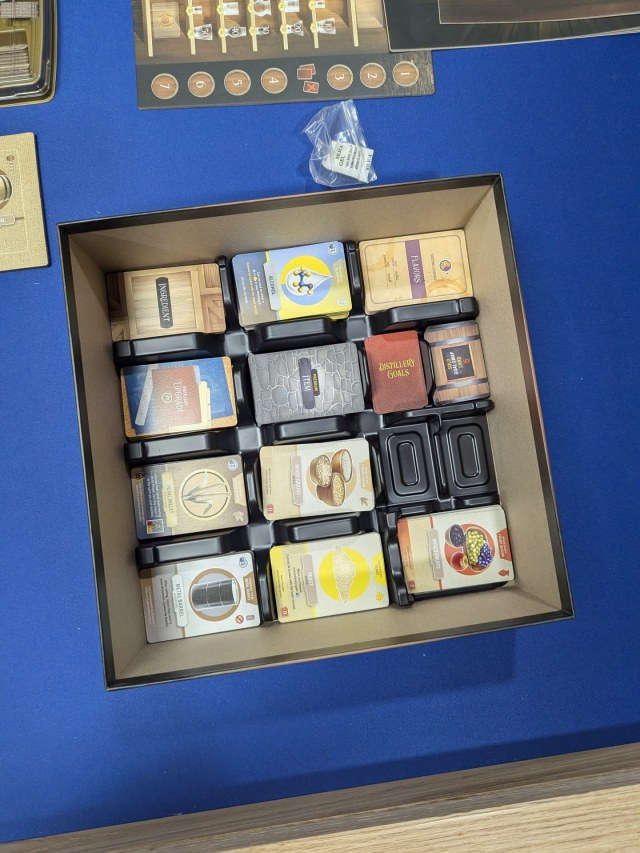Distilled
- Designer: Dave Beck
- Publisher: Paverson Games
- Players: 1-5
- Age: 14+
- Time: 30min/player
- Played with review copy provided by publisher
Distilled is a highly thematic strategy card game about crafting spirits in a distillery, with resource management and push-your-luck elements. In the game, you have inherited a distillery and are hoping to someday achieve the title of master distiller through purchasing goods, building up your distillery, and creating the world’s most renowned spirits. Use cards to purchase new ingredients and invest in upgrades to your distillery, all while eventually distilling the spirit and sending it to the warehouse. Once in the warehouse, age your spirit to enhance its flavor and bottle it to sell it for major profits! Achieve the title of Master Distiller by having the most victory points at the end of the game. Points are obtained by distilling and selling spirits.
To set up the game, choose one of the tasting flight cards to use. Then set up the shelf board with the labels matching the alcohol types seen on the flight. Then set up the basic market (with the 7 types of cards) and the premium market (shuffling the decks for premium ingredients, premium items and distillery upgrades separately and then flipping up 4 cards from each deck). The other components are arranged on the table, and a number of Spirit Awards equal to the player count are chosen at random.
Each player gets their personal distillery board and 2 distiller cards (from those on the Flight card), keeping one of them. The starting ingredients and money are listed on the back of the distiller card that is kept. This also delineates the signature recipe and signature ingredient for the player. Each distiller comes with their own unique special ability. The Flight card is placed on the Clipboard (you only start with the recipes for moonshine and vodka), and the player gets some starting items. Each player also gets three goal cards to start the game.
The game is played over 7 rounds, each with 4 phases: Market, Distill, Sell, Age.
In the Market phase, players take turn buying a single thing: recipe cubes, Basic Ingredient or Item cards (max combined 2 per round), Premium ingredient or item cards, distillery upgrade cards. If you pass, you are out for the rest of this phase and cannot jump back into the buying. Pay for your purchase based on the costs listed on it. When you buy a premium item, immediately replenish the supply by sliding all cards to the right and flipping a new card up next to the deck. At the end of the round, cycle all three premium displays by discarding the rightmost card in each line and dealing out a new card.
The Distill Phase can be done simultaneously by all players. You can first trade one of your cards for a basic ingredient of same or lesser cost, and then move desired cards (yeast, sugar, water, alcohol) into your washback area to the left of your board. Then add one alcohol card to your washback for each card in your sugar slot. Then, shuffle all the cards into a stack and then remove the top and bottom cards and return those to your pantry. Finally, reveal the remaining cards and see if you have made a spirit (according to any recipes that you know at that time). For what it’s worth, you can always make Vodka or Moonshine. If you can add an appropriate barrel card to the stack, add a label corresponding to the recipe you completed. If you need to age your spirit, place it in your warehouse.
In the Sell phase, you can sell finished spirits. Some of the spirits require aging, which means you must hold on to them for at least one round before selling them. Others do not require aging, and they must be sold in the round that you distill them. This is done in turn order, and each player can only sell one spirit at a time. To do so, lay out a spirit stack and then add a bottle from your storeroom. Then calculate the sell value and the SP (spirit point) value of all the cards and gain money/points. Put a label for that spirit on your distillery board bonus track at the top of your board and take the bonus shown. If you used a fancy bottle, keep it in your display area.
In the Age phase, spirits in your warehouse gain flavor due to aging. The spirit stack in placed in the warehouse, and then a barrel card is placed on top of it (and this card may have a special ability associated with it – this is resolved now). Then draw a random Flavor card and place it unseen on the bottom of the stack. These flavor cards will add SP and money value to your spirit.
At the end of the round, all players check to see if they have fulfilled any of the spirit awards set out at the start of the game, if so, take the SP shown on the award. Once it is scored, it is flipped over and cannot be scored again. Additionally, if you did not sell a spirit this round, you can hold a tasting and trade up to 4SP for the same amount of money. At the end of the third round, all players discard one of their three goal cards; they will keep the remaining two to score at the end of the game.
The game ends at the end of the seventh round. The game then moves into the final scoring
- SP for any unsold spirits in your warehouse; take the SP for their cards as well as 1 SP per flavor card
- Score your bottle collection
- Score distillery upgrade cards
- Score your two goal cards
- One SP per 5 money turned into the supply
The player with the most SP wins, ties broken in favor of the player with the most money left over.
My thoughts on the game
Distilled is a game that looks beautiful on the table (though you’ll need a big table), and the gameplay mostly meets the expectation that its appearance sets. Over the seven rounds of the game, you’ll work on making a spirit each round and then figure out how to sell them for the most profit. You have to learn different recipes before you can make more than moonshine and vodka – but rest assured that you will make something every round that you try.
Early in the game, you don’t have much money, so you’re forced to just take the inexpensive basic ingredients. Later in the game, you’ll end up spending more money on the premium ingredients. Being limited to only two basic ingredients means that you’ll be forced to buy the premium stuff just to collect enough things to make a spirit. And, due to the wasting of two cards in each run – you often have to overshoot the sugars in your spirit to make sure that you have enough to make what you intend. There’s nothing more painful than a huge batch of crummy vodka because you wasted a sugar along the way and can’t score the planned victory points out of it… This risk/reward scenario makes a lot of the planning intriguing to me. If possible, I try to have overlapping recipes so that I can at least make a middle grade spirit were I to be unlucky enough to pull out the needed sugars.
You’ll have to decide if/when you’re going to make aged spirits – they take at least an extra turn to mature before you can sell them, but if you’re able to wait, they will pay off with much larger VP returns than simple un-aged spirits that are sold on the turn they are made. The challenge here is figuring out how to have enough money in your treasury to keep your distillery functioning when you have to take a year off without any sales. Sure, you can sell some victory points to host a tasting to generate income – but then, you’re selling your victory points.
As you play, keep an eye on your opponents and their progress towards the Spirit Awards. The rewards here are not insignificant, and I’d venture to say that it is unlikely to win lest you get at least a share of one of these awards. That being said, your personal distillery goals are also potentially valuable, and I’d recommend trying to figure out how your personal goals mesh with the group goals – and at least let that bit steer your early strategy.
I also would not overlook the Distillery upgrades. They are expensive, but most of them seem to pay you back over the course of the game with their ongoing discounts. I made great use of one that allowed me to reshuffle and redraw the top/bottom cards after distillation – that way I could try to get the best cards back as ingredients OR make sure I made the right spirit OR make sure the high valued card was actually scored in the spirit.
There are a few places where the theme integration falls apart… I like the way that you make a stack of cards in the Distill phase and then remove the top and bottom card, which corresponds to the real life process of only taking the middle of a distillation to make a spirit. However, I doubt there is an IRL distillery that doesn’t know what spirit they are making until they see what results at the end of the process… Also, I doubt distilleries would add unknown flavors to their spirits and hope they tasted good after aging!
The rules are really well done, though a bit verbose. The main rulebook starts with setup, and then takes another 3 pages to explain all the different components and how they work in the game. There is also a second rulebook, called First Taste, which provides a nice walkthrough of the first round of the game – allowing players to see the setup and moves made in the initial turn, along with some explanation of the reasons why certain moves were made. I’ll admit that I don’t normally want the rules to tell me the strategy for the game, but for those who need/want it, it’s there to go through. It might be useful in a first game to help people jump in with two feet. I also like the way that the designers have tried to make the theme pervasive through the game, by adding in little blurbs about the different game components/mechanisms and their role(s) in the actual distilling process.
The components and artwork are superb. The game looks gorgeous, and much attention has been spent on little details. My copy of the game also comes with specialized injected plastic trays that store everything just right. Be sure not to lose the sheet of paper that tells you the order in which to stack everything back in the box!
All of the games I have played have been fairly close, and this makes most every decision important. You really have to think hard about what spirit to make, how long can you afford to age something, what sorts of bottles are you going to put your spirit in – either for short term monetary games or for the end-game set collection bonus… Also, you have to always pay attention to the race goals – and try not to deviate from your planned path chasing after those points. All in all, a very well done game and one that I look forward to playing again soon.
Thoughts from other Opinionated Gamers
Josiah Fiscus (5 plays): For some reason these days, brand new designers seem to absolutely knock it out of the park with their first published game. Distilled is one of those games. It demands difficult decisions and careful planning. Nevertheless, these plans are often reactive and tactical rather than proactive and strategic. A player who can optimize while remaining opportunistic is likely to thrive here more than one who comes to the table with a scripted plan before the first cards are dealt. So if your tastes in mid-weight euros tend more towards long-term, abstract gameplay, you’d be forgiven for giving this one a pass. But the little pinch of luck that is added to this highly-tactical formula is a perfect recipe for my personal palate.
Mark Jackson (1 play): As a non-drinker, it always makes me laugh a bit when I turn out to enjoy games about drinking (The Red Dragon Inn) or owning a bar (The Taverns of Tiefenthal or Volle Hutte) or making liquor (Distilled). I agree with Dale that there’s a thematic breakdown of sorts with the whole “what kind of spirits are making?” roulette… but I’m also aware that wineries and distilleries can have bad batches that they simply bottle as cheaper stuff in order not to lose money on the ingredients.
The game system itself is really solid and presents a lot of intriguing problems to solve. I’d be happy to play Distilled again.
Alan How (3 plays): I played this immediately upon receiving it and recently realised I hadn’t played it for ages and needed to correct that. It reminded me how good the game is and though there is luck in getting the right mix, it’s easy to see how to mitigate this. Even if this fails, the runner up option will set you up for the next brewing time. My latest game was a 2 player one, which worked very well so I’d happily play that number or with three players. It hasn’t quite reached the love it stage, but it’s still a really good game with excellent components.
Ratings from the Opinionated Gamers
- I love it! Josiah Fiscus
- I like it. Dale Y, Mark Jackson, Alan H
- Neutral.
- Not for me…


